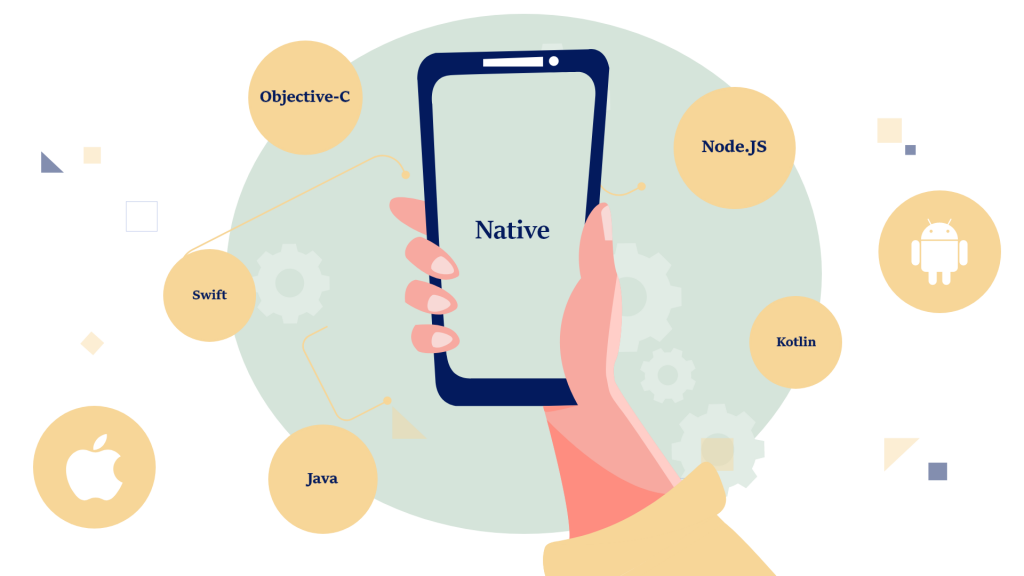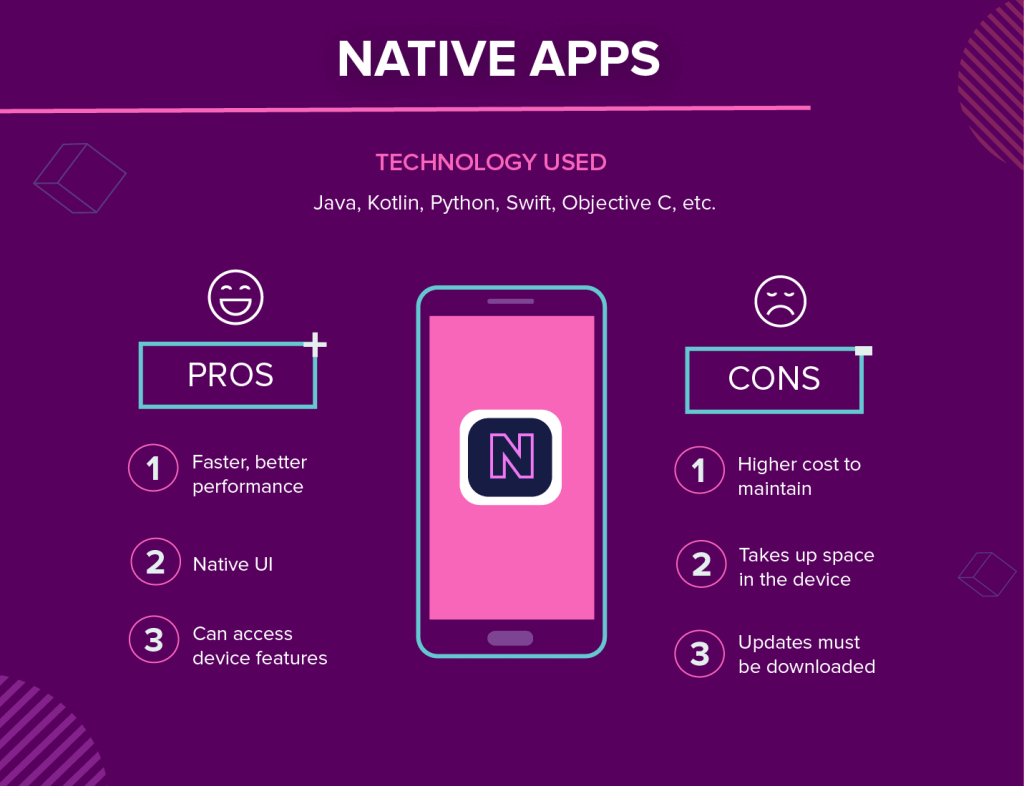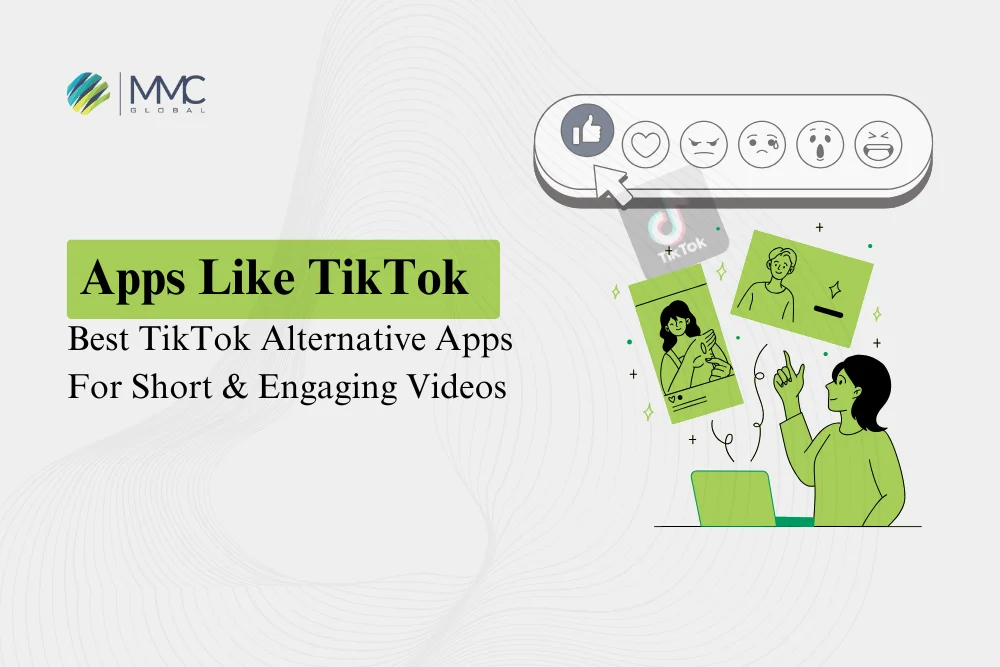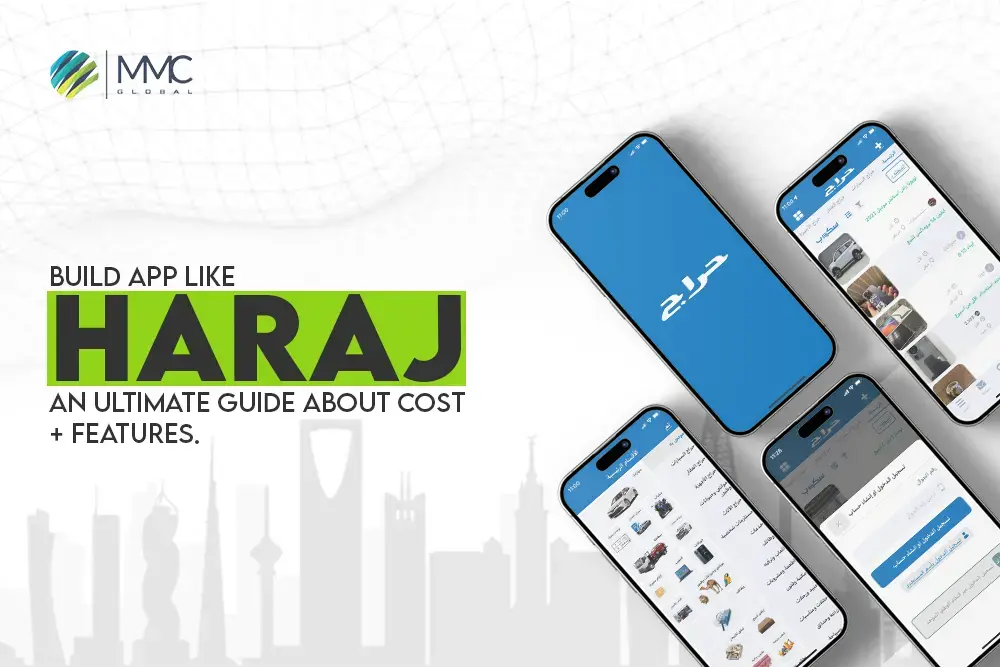Improving the business operations to get the most out of an investment is the primary goal of any business. Business owners are highly invested in making the business operation fast, increasing productivity, providing exceptional customer experience, engaging users, and doing much in less time. Business owners try every possible effort to indulge in the technology so they can rule the market. One of the most emerging trends is native mobile app development to target the intended audience to start the conversion from the initial point.
Mobile application development encourages you to engage and communicate with users and provide facilitation. Moreover, it improves accessibility, increases brand awareness, helps to connect with users, and provides an all-in-one solution marketing platform. By 2023, mobile apps could generate over $935 billion in revenue. That’s impressive.

Investing in Native mobile app development is very fruitful for your intended audience. Many businesses start using it to improve its performance, hi-end security, application running and compilation speed, and effective UX/ UI.
However, if you get it wrong, it might hurt how consumers see your company or prevent them from purchasing your goods. Hiring a professional mobile app developer like MMCGBL can have multiple resources make your ways easy.
So let’s see how Native mobile app development rules the world and how we can develop effective applications from native app development.
What is Native Mobile App Development?
Native mobile app development is about the application only running for the specific platform. There are three major platforms, including iOS, Android, and Windows; you can build native apps according to particular standards. For instance, If you develop a mobile app based on the iOS standard, you are building native iOS applications. It can be either a mobile game application or a health tracker app. Android users cannot even see it if you want iOS users to operate.
In comparison, there are currently more than 2.9 million apps available in the Google Play Store. On the other hand, there are 4.75 million apps available in the Apple App Store. (Statista)
It defines the importance of specific platform-based applications that businesses use to build strong customer relationships. Both iOS and Android rule the mobile app development market by launching millions of apps to date. There are variances in the technique and consequences that might be expected. Therefore it’s essential to comprehend how they differ.
The critical distinction is that iOS is a closed system, but Android is open, which means that Android users have more incredible modification options. Voice assistants differ across the two operating systems and employ different app stores. Although Google Play has a bigger aggregate audience, Apple App Store consumers spend more money on their apps on average.
Key Benefits of Native Mobile App Development

There are various advantages to utilizing native applications for enterprises. There are several drawbacks, comparatively speaking, which we’ll go over in this section. Let’s have a look at the advantages this might provide you.
Running and Compilation Speed
The native mobile app development is mainly run on a single platform that helps run faster. The less loaded the app, the faster it will run. It runs and compiles only in specific architecture and system-specific programming languages. The app processing speed of the device, loading, and runtime is faster.
Latest SDK Improvements
Google and Apple give their development tools and interface components and Software Development Kits to developers who use their platforms (SDK). Access to SDKs speeds up the development process and gives developers direct access to the most updated features.
When the operating system (iOS or Android) is updated, developers can access native APIs. As a result, it benefits from exciting new features and upgrades that it can include in its program.
Simplified Debugging Process
Compared to other apps, such as hybrid or web apps, native apps are easier to address bugs. It is because native apps do not require cross-platform mobile development tools (such as Cordova or Xamarin), which need the use of a bridge to access the hardware or device.
This extra specification present in hybrid apps is uncontrollable by your developer. Additionally, it increases the likelihood of a bug appearing and makes it more difficult to debug when it does. Having bugs-free apps can improve your app’s performance, enhance user loyalty, optimize your app’s reputation, and, eventually, income.
Professionals Native App Developers
Markets are full of tech-savvy people. And surprisingly, you can build connections with native app developers by joining native mobile app communities. You can find a pool of candidates specialized in iOS app development or Android app development. Android developers are more easily accessible in the market as it is an open-source platform. However, it is not a big deal to search out iOS developers. There is a massive demand in the US market that makes people drive to learn more. Although, I have a cost-effective suggestion that hiring a leading native app development company is the best idea instead of hiring the whole team and paying considerable amounts to individuals. Companies like MMC GBL provide you with excellent services with lifetime support. It will be a practical approach to join hands with us.
Effective UI/UX Standards
Without providing clean and delightful UI/UX, your app is nothing, and don’t expect much from it. However, you can find individual guidelines for iOS and Android to help you build a user-friendly interface that ultimately provides a more significant user experience.
You can embed push notifications, a chatbot for real-time assistance, etc. These implementations can be done with iOS server (APNS) and Google’s cloud messaging (GCM). You can implement all the standards and practices to get an engaging user interface for native applications.
These advantages add up to enabling your native apps to be more exciting to use for users and better to construct and maintain for developers. All of which may help you save money on one end of development while increasing revenue.
Nevertheless, there are specific situations in which native apps may be weaker than online or hybrid applications. Let’s look at some of the disadvantages of native mobile app development.
Drawbacks of Native Mobile App Development
The other side of the mirror defines the downside of the Native app development. You can neglect this section if you want to target a specific platform audience. Otherwise, go ahead.
Time-consuming
Most businesses want their app to run on both platforms, i.e., iOS and Android. Native apps do not give you this opportunity as it is specific to a single platform. To build on more than other platforms you need to develop the whole app from scratch according to related OS standards.
Hire Separate Team
It is not cost-effective at all as you need two teams to develop the same app. It is not a worthwhile option to hire individual iOS and Android developers. Moreover, you have first to decide if you need Native mobile app development or want to run your app on a multi-platform. You can opt for Hybrid application development to build a single app for both platforms.
Not Reuse Code
The written code for one platform can not be used for the other platform. For instance, if you build an Android app, you have to write code separately. And if you want to jump over the iOS app, you have to start from scratch and write different code. It requires loads of effort that is highly time-consuming.
Alternatives of Native Mobile App Development
If we are talking about multi-platform app development, we are moving toward another topic, i.e., Cross-platform or Hybrid app development. As Native mobile app development is specific, the cross-platform is vice versa. It gives the opportunity to build one application for both platforms by deploying one-time coding.
We have multiple powerful frameworks that you can take help with and start building your Cross-platform app development.
Best cross-platform app development framework in 2022
React Native App Development
- It is an open-source platform with large community support.
- React Native app development supports Android and iOS platforms very quickly.
- It is a time-saver and cost-effective framework.
- Ready-made components and useful libraries
- Third-party plugin support with easy integration
- Instant and real-time changes without app recompilation
- Helps in building complex mobile applications.
Flutter App Development
- The most in-demand framework for cross-platform app development.
- It is young in the tech field and also has strong community support.
- Support both platforms, Android and iOS, and provide a native-like feel on each platform.
- Google released it in 2017.
- Flutter allows developers to deploy native applications on mobile and web platforms using a single codebase.
- A simple learning curve with a plethora of tools that helps developers learn quickly.
Native Script
- NativeScript also helps in building cross-platform apps by using JavaScript libraries.
- Easy integrations with JavaScript Framework.
- It provides a natural bridge to the functionalities and features. It means you can use CocoaPods and Android SDKs within NativeScript.
- Community is smaller than React Native, but you can find professionals who can help you build your apps.
In The End
Businesses use Native mobile app Development to cater to audiences, improve user experience, provide intuitive UI, and much more. By choosing native development, you can launch your apps faster, with a high-standard User interface, offline access, and scalable functionalities and features.
If you are willing to have a Native mobile app, we are here to support you. Our professionals’ will helps you to define the scope of your project and consult you with the best. Let’s start it today.





